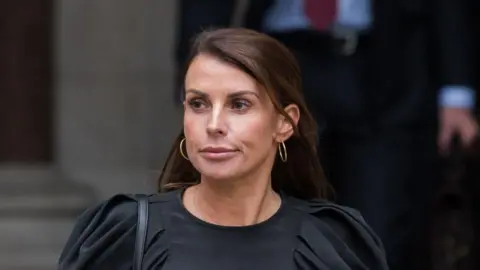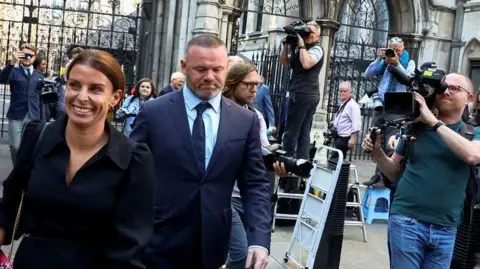
 Getty Images
Getty Images
Coleen Rooney’s lawyers did not commit misconduct, a judge has ruled, after Rebekah Vardy accused her of “deliberately” understating her legal costs during the 2022 Wagatha libel trial.
Mrs Vardy lost that case after a judge ruled it was “substantially true” she had leaked Mrs Rooney’s private information to the press, and was ordered to pay 90% of Mrs Rooney’s costs.
The original cost estimate was £540,000 – it now stands at £1.8m.
Barristers for Mrs Rooney and Mrs Vardy have now returned to the High Court in a dispute over how much should be paid.
In a ruling on Tuesday, senior costs judge Andrew Gordon-Saker found “on balance and, I have to say, only just”, that Mrs Rooney’s legal team had not committed wrongdoing.
He said it was therefore “not an appropriate case” to reduce the amount of money that Mrs Vardy should pay.
He added that while there was a “failure to be transparent”, it was not “sufficiently unreasonable or improper” to constitute misconduct.
Mrs Vardy’s barrister, Jamie Carpenter KC, had claimed in written submissions that Mrs Rooney had “deliberately misled” Mrs Vardy and the court with previous estimates of how much money and time she had spent on the case, which he claimed was “serious misconduct”.
He told the court on Monday that she had previously “deliberately understated” some of her costs so she could “use the apparent difference in incurred costs thereby created, to attack the other party’s costs”.
He argued that this should lead to a reduction in the amount of money Mrs Vardy has to pay, but the judge disagreed.

 Getty Images
Getty Images
Mrs Rooney’s legal bill was said in October 2022 to total £1,667,860, but has now risen to £1,833,907, the court was told on Monday
Mr Carpenter said that the figure was three times over Mrs Rooney’s agreed costs budget of £540,779, which he said was “a remarkable increase”.
But Robin Dunne, representing Mrs Rooney, said it was “misconceived” to claim the amount owed should be reduced, and that the budget was “not designed to be an accurate or binding representation” of her overall legal costs.
On Monday, he said: “Mrs Vardy’s argument appears to arise from her frustration that her deplorable conduct in this litigation has led to the budgets becoming irrelevant.
“Had Mrs Vardy conducted this matter in a reasonable fashion, Mrs Rooney would be confined to her budget and would have recovered no more absent good reason.”
This week’s hearing, which concludes on Wednesday, is dealing with points of principle, before a line-by-line assessment of costs. This will take place at a later date.
Neither Mrs Vardy nor Mrs Rooney attended court on Tuesday.

 Reuters
Reuters
Nobu hotel costs
On Tuesday, Mr Dunne said that claims made in court on Monday about hotel costs incurred by a lawyer representing Mrs Rooney in 2022 were “factually incorrect”.
Mrs Vardy’s KC Jamie Carpenter had said Mrs Rooney’s total included costs for a lawyer staying “at the Nobu Hotel, incurring substantial dinner and drinks charges as well as mini bar charges”.
But Mr Dunne, noting the charges had been widely reported in the media as “evidence of the defendant wildly spending”, said they were “potentially defamatory” and steps would be taken.
He added that a “modest” hotel had been booked for the lawyer, but on the first night there had been no wi-fi or working shower, so he transferred to the Nobu after Mrs Rooney’s agent said she could get reduced rates.
A room at Nobu ordinarily costs £600 but was charged at £295, which he said was the same price as a room at a Premier Inn.
Addressing the claim that £225 had been spent on a food and minibar tab, Mr Dunne said the minibar bill had actually come to £7 for two bottles of water, and that the lawyer had not eaten at the Nobu restaurant during his stay.


Judge Gordon-Saker also rejected one of Mrs Vardy’s claims that it was “unreasonable” for Mrs Rooney to use Stewarts, a London-based law firm, and that she should have sought one near to where she lived in the north west of England.
Mr Gordon-Saker said: “This was always going to be a high-profile case and it attracted significant press coverage both here and elsewhere.
“Defamation is still a specialist area and most of the firms who specialise in defamation are based in central London.”
Regarding the size of the claim and the importance of the matter to the “reputations at stake”, he said “instructing a solicitor in central London was a reasonable choice”.
The judge also rejected Mrs Vardy’s claim that it had been unreasonable for Mrs Rooney to consult her barrister, David Sherborne, on 30 occasions, at a cost of nearly £500,000.
Mr Gordon-Saker added that the conduct of Mrs Vardy – in particular destroying evidence – “adds to the complexity” and “clearly justifies rates in excess of the guidelines” for the most experienced lawyers.
But he did say less experienced lawyers should have been charged at a lower hourly rate.








